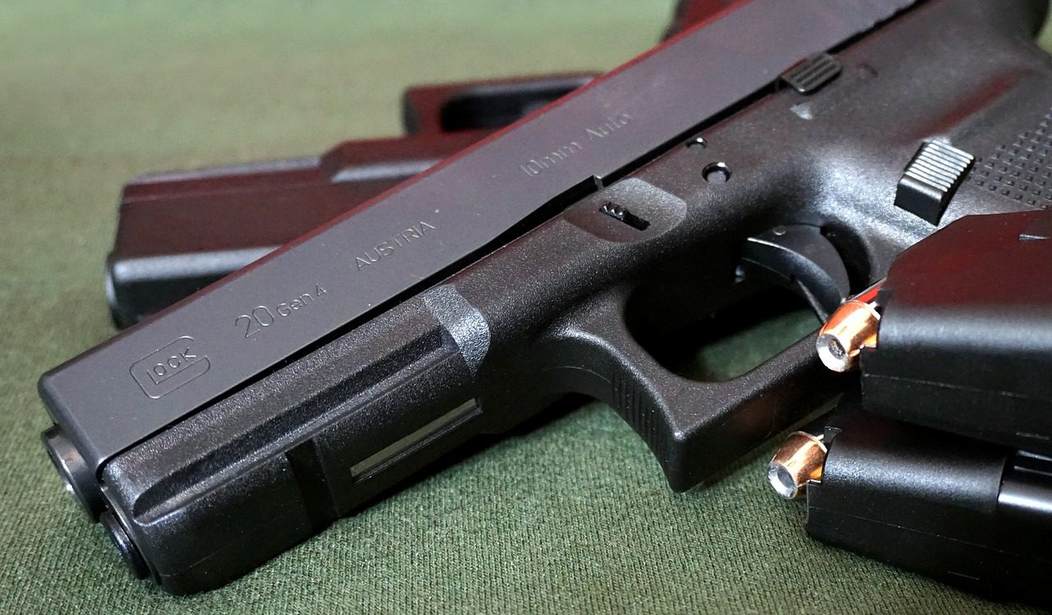Ever since Merrick Garland was named Attorney General, the Justice Department has taken the position that the right to keep and bear arms only applies to "law-abiding citizens"; a vague term that could ostensibly deprive even speeders and jaywalkers of their Second Amendment rights. But now the U.S. Attorney in San Diego has decided to drop its prosecution of rapper Boosie Badazz, who was charged with illegally possessing a gun after a previous non-violent conviction for drug offenses. That could signal a change of heart for the DOJ, or at least a calculated political ploy to appeal to criminal justice reformers ahead of the election.
Badazz, who's real name is Torence Ivy Hatch, had requested through his attorneys that U.S. District Judge Cathy Bencivengo throw out his charges, citing a Ninth Circuit decision in May that held a blanket prohibition on gun ownership for all convicted felons, including those convicted of non-violent offenses, was unconstitutional and a violation of their Second Amendment rights. The U.S. Attorney didn't object to the rapper's request, despite having done so once before, and last Friday Bencivengo granted Badazz's request and dismissed the charges.
The U.S. Attorney’s Office in San Diego did not respond to questions about the case, including its decision not to oppose Hatch’s dismissal request either in writing or at Friday’s hearing.
Hatch’s case is one of the first, and the most high-profile, to be dismissed because of the 9th Circuit’s May ruling, which could soon have a much broader impact.
Since 1938 when Congress enacted the Federal Firearms Act, the federal government has barred people convicted of felonies from owning or possessing guns.
But the blanket ban on felons possessing firearms has come under closer scrutiny since the Supreme Court’s June 2022 ruling in New York State Rifle & Pistol Association v. Bruen, which established a new legal framework in which weapons laws must follow the “Second Amendment’s plain text” and must be “consistent with the nation’s historical tradition of firearm regulation.”
It's important to note that U.S. Attorney Tara K. McGrath and her team could have opposed the request by the rapper's defense team. They might not have been successful, but it was still an option for the DOJ, and one we'd expect McGrath would have taken given the department's position on who, exactly, gets to exercise their right to keep and bear arms.
Instead, the DOJ remained silent regarding Badazz's motion, and so far at least, is keeping mum about the decision to step aside and let Bencivengo render her verdict without objection from prosecutors.
What's even stranger about the U.S. Attorney's silence is that the Ninth Circuit decision that came down in May might not be the last word in the case. Prosecutors in U.S. v. Duarte have asked for an en banc review of the three-judge panel's decision, and it's entirely possible that the appellate court could issue a future ruling that does allow non-violent felons to be prosecuted for possessing a firearm. Duarte isn't exactly settled law, but the U.S. Attorney in San Diego is acting, at least in this case, like there's no other option but to let go of Boozie Badazz's case.
I'm not disappointed with McGrath's decision, but it's definitely unexpected. The real question, though, is whether this represents an actual shift on the part of DOJ or is merely McGrath attempting to adapt to what could be the standard in the Ninth Circuit going forward; non-violent felons cannot be automatically deprived of their Second Amendment rights based solely on their conviction or guilty plea.
My guess is that McGrath's conclusion does not represent official DOJ policy. If it did, Garland himself would almost certainly have made an announcement to that effect, if only to show progressive criminal justice reform advocates that the Biden administration is taking a more measured and reasoned approach to prohibited persons cases.
Instead, the DOJ filed a brief with the Supreme Court last month urging justices to grant cert to several cases dealing with non-violent offenders who argue their Second Amendment rights are being violated, arguing that even after the Court's decision in Rahimi, there's still a great deal of confusion about who, exactly possesses the right to keep and bear arms after a criminal conviction.
The vast majority of district courts have upheld Section 922(g)(1), but many others have issued decisions striking the statute down. Some of those decisions have involved felons with convictions for violent crimes, such as murder, manslaughter, armed robbery, and carjacking. Some have involved felons with convictions for drug crimes. And some have involved felons with convictions for other types of offenses.
Although Rahimi undermines the reasoning of the decisions holding Section 922(g)(1) invalid, the present conflict is unlikely to resolve itself without further intervention by this Court. And the costs of deferring this Court’s review would be substantial: Disagreement about Section 922(g)(1)’s constitutionality has already had widespread and disruptive effects. Out of the approximately 64,000 criminal cases reported to the Sentencing Commission in Fiscal Year 2022, more than 7600 involved convictions under Section 922(g)(1). Those convictions accounted for nearly 12% of all federal criminal cases. Uncertainty about the statute’s constitutionality thus affects a significant proportion of the federal criminal docket.
The Court did grant cert, but only to vacate the lower court decisions and remand the prohibited persons cases back down to the appellate courts for further review in light of Rahimi. According to DOJ, that not only has "widespread and disruptive" effects on the judicial system, it puts public safety at risk by allowing "potentially dangerous persons" access to a firearm.
That's still DOJ's official position, which makes McGrath's choice not to object to dismissing Boosie Badazz's case an odd one, to say the least. Since McGrath isn't talking, it's impossible to know what sparked her decision, but I think its fair to say that we won't be seeing Merrick Garland adopt her outlook as Justice Department policy anytime soon.








